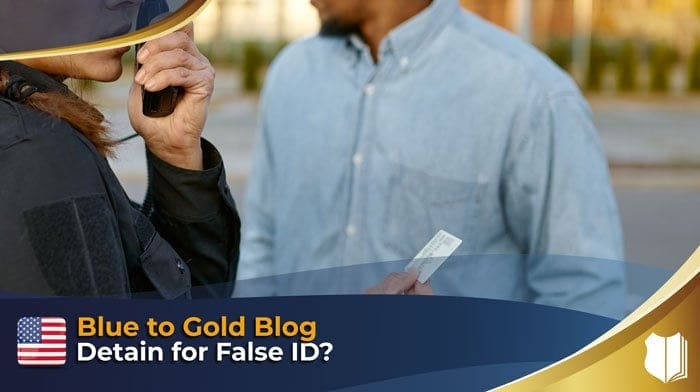CAN YOU DETAIN A PERSON FOR FALSE ID?
This question comes from an officer in Iowa. Can a person be detained if they give you a false name during a consensual encounter?
You’re having a consensual contact and you ask the person to provide their name and date of birth. They give you a name and a date of birth, but then they said they need to go. So they start walking.
You run that person after the contact. So imagine this person walking away, and you find out that they gave you a false name, either a real name that belongs to somebody else, or a fake name completely. Does that give you reasonable suspicion for a detainment?
As you know, people who lie are often wanted, and so forth. But also, in a real world, maybe just let the guy go and try to identify him later through body cam, and so forth.
But let’s look at the law here. Actually, it’s two different things, right? If the person gave you a false name that was not associated with anybody else, I say no detainment. It is not generally illegal to give an officer false information during a consensual encounter, because there’s no legal requirement to be truthful.
In an extreme case, you say, “Hey, sir, so can I talk to you?” The guy goes, “Yeah, what’s up?”
And you say, “What is your name?” He says, “I’m Donald Duck.”
You go, “You don’t believe you’re really Donald Duck? You messing with me?”
He says, “No, you’re right. I’m not Donald Duck I’m Mickey Mouse.”
What are you going to do about that? That’s the way I look at that. There’s no legal obligation for him to give you the information. That’s kind of an extreme example using Donald Duck, just to be funny.
But a person providing inaccurate information during a consensual encounter; does it at least contribute to reasonable suspicion? Absolutely, if you had some other facts, plus that, to actually make a detention. But lying about their name, in and of itself during a consensual encounter cannot allow a further detention unless there is other reasonable suspicion.
Here is the other thing, however. Using somebody else’s information may be a crime, right? That’s like a form of identity theft. And there actually may be laws on the books in your state that do not allow a person to represent themselves as another person.
I’d be surprised if if there is any state out there that would not criminalize that kind of behavior. So if you have that situation, that’s what I would look into.
Now, if you have a person and you can articulate that you believe that this person has used somebody else’s identity during an encounter with law enforcement, even the consent one, I do believe that that’s reasonable suspicion for criminal conduct.
So there’s your answer. I Hope it helps. Keep the questions coming, guys. See you next time!











